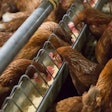Egg industry leaders from around the world gathered together for the International Egg Commission’s (IEC) annual Marketing and Production Conference in September. Over 430 people attended the conference, which this year was held in the city of Prague in the Czech Republic.
The theme of the conference was “The Power of Eggs – Making the Most of Our Future”. Delegates were given the opportunity to hear from highly acclaimed, expert speakers, as they discussed the challenges facing agriculture, and egg farmers in particular, in the battle to produce sufficient sustainable food to feed the world’s growing population.
The resounding message of the conference was the importance of Corporate Social Responsibility and the need for sustainability. Figures produced by both the United Nations and the Food and Agriculture Organization (FAO) show that the global population will increase by a staggering 3 billion people during the next 40 years; meaning that the world will need to produce at least twice as much food.
The scale of this challenge means that feeding an individual country’s population is no longer a local, national issue, but now must be seen as a global issue.
Eggs have the power to feed the hungry
Delegates heard more about how the eggs that their industry donates each year are being used to help to feed the hungry throughout the world. Over the past 12 months, egg producers and processors from around the world have donated at least 50 million eggs to the needy in Africa, Asia, Europe and Americas.
The FAO calculates that worldwide, 1 billion people are currently underfed or undernourished. However, this is just the tip of the iceberg; if we cannot adequately feed the world’s current population, how do we expect to feed an additional 3 billion people? This question was posed time and again by numerous speakers.
The egg producers’ time
Now could be the egg producers’ time. This was the message from Sean Rickard, an expert on agricultural policies and food supply chain relationships. As the population grows, farmers throughout the world must find ways to produce higher quantities of food, using more efficient farming systems. He urged people to: “stop thinking that high production, highly efficient farming systems are something we don’t like”.
Rickard explained that, by 2050, more than a third of the global population will live in just two of the world’s countries; China and India. In only 40 years, the Indian population alone will increase by more than the current number of people living within the entire European Union. With the population rising fastest in countries already struggling to feed their people, how to feed the world must be addressed as a global problem, not a national one.
Rickard went on to say that “we need to stop well fed consumers in rich countries believing new organic systems will feed the world”, the world must address the basic right for people to be well fed, and he believes this can only be achieved if farmers increase productivity using sustainable high production systems.
Sustainability
Attendees expressed their on-going commitment to providing high quality nutritious eggs to help to feed the world’s growing population, and their on-going commitment to the environment. Sustainability was discussed at length by numerous speakers. Dr David Bosshart from Switzerland explained that sustainability is no longer just a political issue, but is now an economic and marketing issue too.
Dr Jason Clay from the World Wildlife Fund posed the question: “How do we feed 9 billion people while maintaining the planet?” The answer, according to Clay, once again lies in corporate social responsibility and sustainability. Clay, like Rickard, stressed the importance of more efficient farming methods. He believes the world needs to aim to produce three times as much food as it currently does, in the hope that it will succeed in producing at least twice as much.
An egg is a mineral cocktail
Expert nutritionists, Professor Wilhelm Windisch and Dr Don Layman each addressed the IEC conference, sharing some of their latest nutritional research data on eggs. Professor Windisch described eggs as a “mineral cocktail”, containing all the macro minerals people require in very well balanced quantities.
Welcome to the new chair and vice chair of the IEC
During the Gala Dinner, which celebrated the end of another successful conference, the IEC welcomed Joanne Ivy, president of the American Egg Board, as its new chair. Joanne became President of the American Egg Board in 2007, and has served on its staff for over 20 years; her expertise and commitment to the egg industry will be a huge benefit to the IEC as she begins her term of office as chair of the International Egg Commission. Members also welcomed Cesar de Anda from Mexico, who was elected as the IEC’s new vice chair.
IEC conferences are held twice a year; in April 2011 the conference will be held in London UK, and in September 2011 in Washington DC, USA. Come and join the IEC and profit from a direct exchange of ideas with professional colleagues.


















